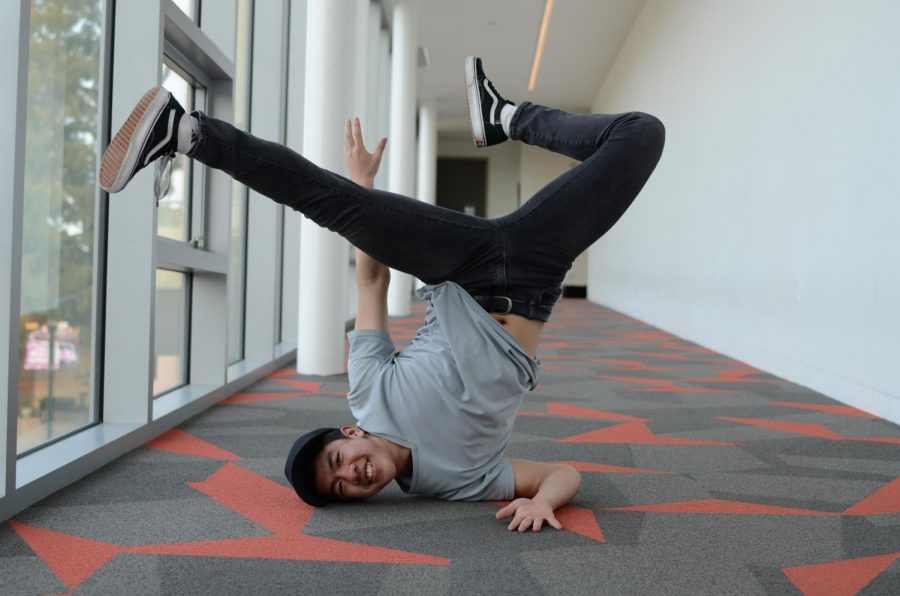Humans of Harker: The humble artist
Kai-Ming Ang (12) creates facets for his emotions
“Dance is a bit easier to deal with that anxiety because I just put all that energy into the movement that I’m doing, but for music, you have to really control it and that’s still hit or miss for me. What helped me was when I moved over to horn and playing in the orchestra. There’s a bit of added pressure because I knew that people depended on me, but at the same time, it was less. It felt comforting to know that my friends were there to support me also,” Kai-Ming Ang (12) said.
A group of boys dressed in black vests covered with silver designs moves to the music on stage. In the center, the choreographer of the piece, Kai-Ming Ang (12), moves purposefully, solidly hitting each move with intention.
Just by looking at the dancers on the stage, one wouldn’t know that Kai only started dance in freshman year. From trying dance for the first time as a freshman to choreographing for the dance production as a senior, Kai has put his all into this art.
In the beginning, Kai danced as a way to spend time with his friends and share and learn together. Over the years, it developed into something more.
His friend Hanoom Lee (12) recalls the start of Kai’s dance career.
“I remember when he first tried to do dance in 9th grade. I think Jason [Pan (12)] influenced him to do dance, and he was like, ‘oh, why not, I’ll just try dance even though I’m not very good at it, ‘ and it’s cool to see how far he’s grown,” Hanoom said.
Starting dance later in comparison to some of his teammates gives Kai a slightly different perspective. To him, it emphasizes some important values.
“One big thing for dance was just being humble,” Kai said. “I started out as the newest kid to dance in the dance production. Now, even as the choreographer of my dance, kids in my dance had more years than me in dance, so it’s always being open to what others have to say and just remembering that I’m just like everyone else.”
In dance, Kai finds the ability to be more vulnerable with the people around him. One specific instance of this was during his first dance show.
“I remember talking to Linus [Li (’18)] a lot during that dance show. Originally I was just asking him for help on one of the dances that I was in, but then as we continued to talk, being there with him and having him physically teach me what I need to do right in dance, it made me mentally open up,” he said.
Besides just the visual and social aspects of dance, Kai also sees it as a vessel for self-discovery.
“When I choreograph or learn a dance I’m often figuring things out about myself, and then when I perform, whatever I really took away from that, personally, is what shows my performance,” he said.
Not only did dance help him with self-discovery when choreographing and learning, it also allowed him to forge his own path and separate himself from his older brother’s shadow.
“I was always mini Kai, I was Kai number two … Dance was the first point where I started to realize I’m my own person and … it was a relief,” Kai said. “As my own life trajectory, dance really informed that because it split me off the path of my family.
In the end, his love for the sport boils down to the joy of doing it, as well as everything it does for him. He is unconcerned in the superficial.
“It’s really easy to just forget why you’re dancing,” Kai said. “In the end, you just want to be enjoying yourself and sometimes people get hyper-competitive, or get too fixated on roles and who’s center or who has solos. You forget that you’re just there to have fun.”
Dance is not the only artistic facet that he turns to. As a composer, Kai also explores his emotions through music.
“There was a piano solo that I wrote that was really a lot more jarring … it was also during one of my hardest times, just in general in the middle of junior year,” he said. “The harmonic language that I explored was very atonal and a lot more bold, so I guess it helped me be more comfortable with having a wider range of emotion.”
While both dance and music help him discover and express, they do so in different ways.
“Music is more reflective. I’ll spend time playing on the piano or composing on my computer or playing on my French horn and it’s a lot more alone time, a lot more thinking about myself, whereas dance, it’s a lot more, again, social. It’s with my friends,” he said.
Although he seems natural on the stage and can be seen performing at multiple events throughout the school year, the arts are not something that Kai always thought he would pursue.
“I didn’t expect to do any of what I did because even before I started horn I thought ‘oh, I’m just gonna be an engineer or a doctor or something’ and I never really thought I’d want to do music or dance, but something about it helps me fill the void that academics don’t fill,” he said.
After being helped by older students in the community, Kai passes it forward. Even if it isn’t strictly an assignment, he’s always open and willing to lend a hand.
“He went through the effort of teaching me one of his dance composition pieces for fun and that moment has stuck with me for a long time,” his friend Kai Due (10) said.
He is happy to help whether it be simply teaching a dance just for fun or helping with assignments.
“I was going to conduct for orchestra and I went to Kai because obviously he’s the first person that I would go to for conducting help,” Spencer Cha (10) said. “We met up one day before school started: he got there early, I got there early. We just went through a piece and he was helping me out with suggestions, so it’s probably one of the most memorable moments.”
Even after having come so far, Kai continues to push himself and constantly work towards improvement.
“I’m so nervous before any performance,” Kai said. “When I was really little and my mom had me learn piano, I really hated it and I was always anxious to get on stage and everyone told me that it’d get better over time, but never really did.”
But different aspects of each art help Kai to moderate these nerves.
“Dance is a bit easier to deal with that anxiety because I just put all that energy into the movement that I’m doing, but for music, you have to really control it and that’s still hit or miss for me,” he said. “What helped me was when I moved over to horn and playing in the orchestra. There’s a bit of added pressure because I knew that people depended on me, but at the same time, it was less. It felt comforting to know that my friends were there to support me also.”
Anna Miner (12), his friend and fellow choreographer, admires the way he portrays his talents.
“It’s amazing how artistic he is. It’s pretty rare that someone is so good at dance, music, and then also arts and crafts,” she said. “Someone with his talent could be arrogant and things like that but he’s definitely the opposite.”

Irene Yuan (12) is the co-managing editor of Harker Aquila with a focus on multimedia and social media. This is her fourth year on staff, and she hopes...

Erica Cai (12) is the co-editor-in-chief of Humans of Harker, and this is her fourth year on staff. Her goals in journalism this year are to celebrate...


















![“[Building nerf blasters] became this outlet of creativity for me that hasn't been matched by anything else. The process [of] making a build complete to your desire is such a painstakingly difficult process, but I've had to learn from [the skills needed from] soldering to proper painting. There's so many different options for everything, if you think about it, it exists. The best part is [that] if it doesn't exist, you can build it yourself," Ishaan Parate said.](https://harkeraquila.com/wp-content/uploads/2022/08/DSC_8149-900x604.jpg)




![“When I came into high school, I was ready to be a follower. But DECA was a game changer for me. It helped me overcome my fear of public speaking, and it's played such a major role in who I've become today. To be able to successfully lead a chapter of 150 students, an officer team and be one of the upperclassmen I once really admired is something I'm [really] proud of,” Anvitha Tummala ('21) said.](https://harkeraquila.com/wp-content/uploads/2021/07/Screen-Shot-2021-07-25-at-9.50.05-AM-900x594.png)







![“I think getting up in the morning and having a sense of purpose [is exciting]. I think without a certain amount of drive, life is kind of obsolete and mundane, and I think having that every single day is what makes each day unique and kind of makes life exciting,” Neymika Jain (12) said.](https://harkeraquila.com/wp-content/uploads/2017/06/Screen-Shot-2017-06-03-at-4.54.16-PM.png)








![“My slogan is ‘slow feet, don’t eat, and I’m hungry.’ You need to run fast to get where you are–you aren't going to get those championships if you aren't fast,” Angel Cervantes (12) said. “I want to do well in school on my tests and in track and win championships for my team. I live by that, [and] I can do that anywhere: in the classroom or on the field.”](https://harkeraquila.com/wp-content/uploads/2018/06/DSC5146-900x601.jpg)
![“[Volleyball has] taught me how to fall correctly, and another thing it taught is that you don’t have to be the best at something to be good at it. If you just hit the ball in a smart way, then it still scores points and you’re good at it. You could be a background player and still make a much bigger impact on the team than you would think,” Anya Gert (’20) said.](https://harkeraquila.com/wp-content/uploads/2020/06/AnnaGert_JinTuan_HoHPhotoEdited-600x900.jpeg)

![“I'm not nearly there yet, but [my confidence has] definitely been getting better since I was pretty shy and timid coming into Harker my freshman year. I know that there's a lot of people that are really confident in what they do, and I really admire them. Everyone's so driven and that has really pushed me to kind of try to find my own place in high school and be more confident,” Alyssa Huang (’20) said.](https://harkeraquila.com/wp-content/uploads/2020/06/AlyssaHuang_EmilyChen_HoHPhoto-900x749.jpeg)



